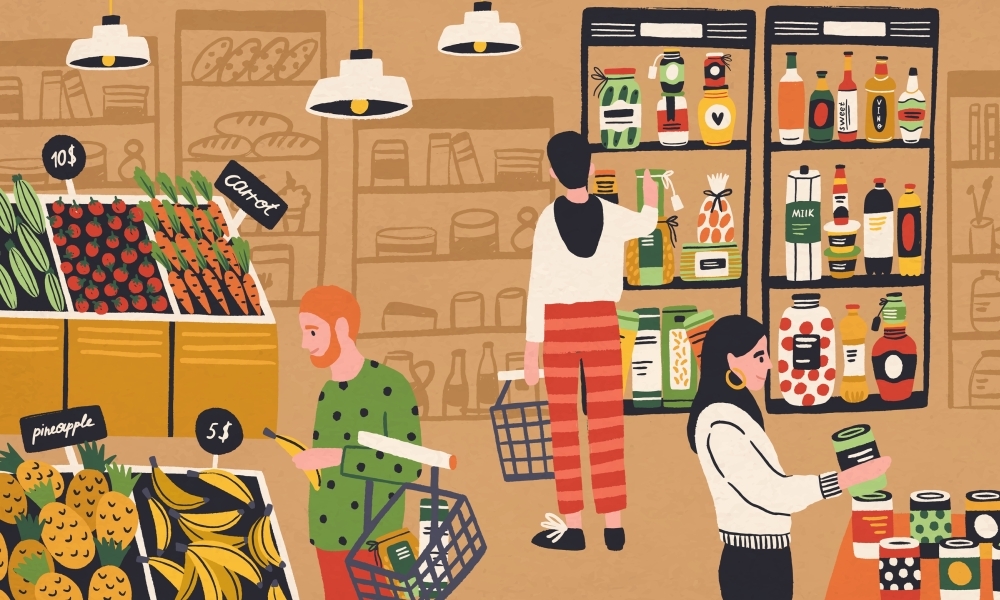What is the relationship between what we eat and how we feel? And, which foods should we be eating to improve our brain function and mental health?
Research shows that poor dietary choices can make you feel tired, lethargic and impair your immune function. But important associations have been identified between food, mood and mental wellbeing (Adan et al, 2019). Other research using specific interventions to improve dietary intakes is showing promise as an approach to help reduce symptoms of depression (Firth et al, 2019).
In 2017-18, the National Health Survey found that 51.3 per cent of Australian adults met the guidelines for recommended daily serves of fruit (two serves), while 7.5 per cent met the guidelines for recommended daily serves of vegetables (five to six serves for men depending on age, and five for women). Only 5.4 per cent of Australian adults met both guidelines (Australian Bureau of Statistics, 2018).
Dr Clare Collins is a Professor of Nutrition and Dietetics, and Director of Research in the School of Health Sciences at the University of Newcastle. She says every bit of effort we make to improve our eating habits reduces our risk of chronic disease and improves our wellbeing.
‘When you look at the relationship between diet and how the brain works, the food you eat is the primary fuel that the body has for all of its functions – so, not just growth and repair, but how your muscles are fueled, your body repair itself, and how your brain can fuel itself, including producing all the hormones and neurotransmitters that it needs,’ Collins tells Wellbeing by Teacher.
The National Health Survey also showed Australians obtained over a third (35 per cent) of their total energy from 'discretionary foods'.
‘They come from what the Australian Guide to Healthy Eating deems discretionary choices, so they’re the foods that don’t even make it onto the plate because they’re energy dense and nutrient poor, or there’s a relationship between high intakes and poorer health,’ Collins adds.
Food and mental health
A study published in Proceedings of the Nutrition Society provides evidence that what we eat has an impact on our mood and overall mental health. This also affects what we choose to eat. Food choices are likely to change when people are feeling stressed, anxious or bored (Owen & Corfe, 2017).
Collins says it’s not surprising that people who have mental health conditions have poorer dietary patterns.
‘If you’re struggling with a mental health condition where it’s hard enough to actually do your self-care, you’re not going to be whipping down to the supermarket, pre-planning all of your meals or have that same amount of cognitive capacity to devote to meal planning and meal preparation, as if you were not living with that mental health condition,’ she says. ‘This means that people living with a mental health condition need more support from others to help them eat well.’
In 2017-18, 51.3 per cent of Australian adults met the guidelines for recommended daily serves of fruit (two serves), while 7.5 per cent met the guidelines for recommended daily serves of vegetables (five to six serves for men and five for women). Only 5.4 per cent of Australian adults met both guidelines.
Foods that fuel your brain
Collins says that junk foods and fast foods are so prolific in our culture that eating has become part of our entertainment, and people forget about the nourishment side of nutrition. ‘When you start to drill down and look at what’s in food that actually influences your brain, then it starts to become a little bit clearer.’
Here, Collins outlines some key things you could try to incorporate into your diet that would help with the fuelling and functioning of your brain.
Omega-3 fatty acids
‘Research indicates that omega-3 fatty acids have important functions in brain health. Some types of fats get converted into neurotransmitters and that’s how your brain talks to other parts of the body. The main source of energy to fuel those brain cells and get the synapses to be produced is glucose. So when you digest any type of carbohydrate, it ultimately ends up in the simplest form of carbohydrate, as glucose in your blood. And your brain has a high requirement for glucose as its main and preferential fuel.’
Protein
‘Protein is made up of amino acids and they’re the building blocks of your brain cells as well. If you look at one of the amino acids, it’s called Tryptophan, it helps your brain increase the production and uptake of serotonin, and serotonin is responsible for mood. So if you had a shortage of Tryptophan, which is a major protein, then your mood would be depressed because you wouldn’t have the same ability to take up serotonin.
‘And then there are other animo acids in the brain like Taurine and Glutamate. Amino acids are the building blocks for some of the hormones that are needed and used by the brain, as well as for the actual functioning of the brain cells.’
Vitamins and minerals
‘The B vitamins – so that’s B1, B2 and B3, and then B6 (Pyridoxine), B9 (Folate) and then B12 (Cobalamin). If you have deficiencies of some of the B vitamins, your brain cannot function optimally.
‘Then minerals like iron – well if you’re iron deficient, you’re not going to get enough oxygen to your brain so that it can function optimally. Zinc is involved in enzymes that are related to those neurotransmitters again and then the development of brain cells. Another mineral that is important in brain health is iodine.’
Water
‘If you’re partly dehydrated, the chemistry aspect of your brain and the chemicals that need to cross those synapses to get from one brain cell to the other or one neurone to the other, they’re are not able to travel as easily because you’re partly dehydrated. There has been studies that have shown that when people are dehydrated they actually can’t perform specific tasks as well as if they’re well hydrated.’
Finding comfort in cooking
In our annual reader survey, we asked educators how they care for their own wellbeing and many said they’ve turned to cooking at home as a way to bring comfort to themselves and their families.
Collins agrees that cooking at home is a way of nurturing yourself and other people, and it is also a way to ensure you’re eating healthier meals.
‘When you cook, you’re more likely to sit at the table,’ she says. ‘It’s when you eat junk food that you’re more likely to sit on the lounge in front of the television. So I think it’s reconnecting people with some of their most fundamental values.
‘I think it’s the ritual, it’s the comfort, people are talking to one another, they’re getting reconnected and it’s kind of like back to basics and that’s really comforting. And the other thing is a lot of people are digging up old family recipes and that’s triggering memories of their childhood, so that’s definitely something positive.’
Professor Collins has developed a technology-based tool for dietary assessment called the Healthy Eating Quiz, which is designed to help you rate how healthy your eating habits are. In addition, her website No Money No Time debunks diet myths and publishes recipes, tools, advice and credible nutrition information that makes healthy eating easy.
References
Adan, R. A., van der Beek, E. M., Buitelaar, J. K., Cryan, J. F., Hebebrand, J., Higgs, S., ... & Dickson, S. L. (2019). Nutritional psychiatry: towards improving mental health by what you eat. European Neuropsychopharmacology, 29(12), 1321-1332.
Australian Bureau of Statistics. (2018). National Health Survey: State and territory findings. https://www.abs.gov.au/statistics/health/health-conditions-and-risks/national-health-survey-state-and-territory-findings/2017-18
Firth, J., Marx, W., Dash, S., Carney, R., Teasdale, S. B., Solmi, M., ... & Sarris, J. (2019). The effects of dietary improvement on symptoms of depression and anxiety: a meta-analysis of randomized controlled trials. Psychosomatic medicine, 81(3), 265.
Owen, L., & Corfe, B. (2017). The role of diet and nutrition on mental health and wellbeing. Proceedings of the Nutrition Society, 76(4), 425-426.
How do you care for your own health and wellbeing? Do you have any recipes that you’d like to share with your colleagues in education? We’d love to hear about them. Email us with a brief outline and we’ll be in touch.


